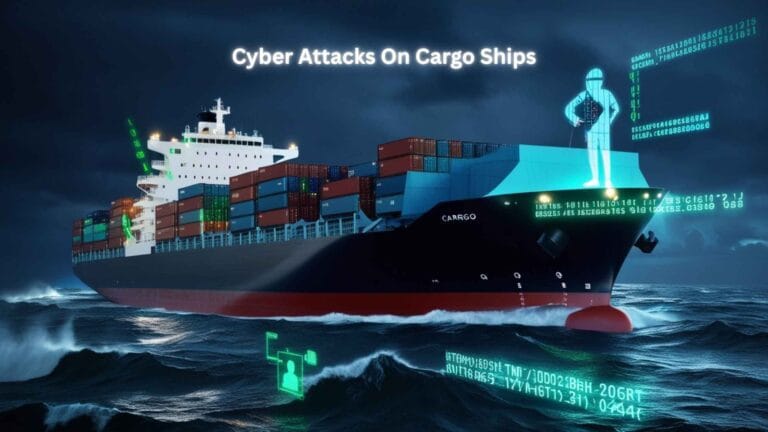Ever thought a massive cargo ship could be hijacked, not by pirates, but by hackers? It sounds like a Hollywood plot, but it’s a real and growing threat. In 2024, cybersecurity researchers demonstrated how hackers could remotely steer a vessel off course without ever stepping on board.
The truth? Modern ships rely on vulnerable tech, from GPS to Wi-Fi, making them floating cyber targets. But the good news is, with the right safeguards, these attacks can be prevented. Let’s dive into how hackers exploit ships, real-world cases, and how the maritime industry is fighting back.
How Hackers Could Take Over a Ship: Here’s What’s Really Happening
Hackers exploit weak onboard networks, GPS spoofing, and unsecured satellite systems to hijack navigation.
Most people imagine cyberattacks targeting banks or social media, not giant cargo ships. But modern vessels are floating data centers, relying on:
- GPS for navigation (easily spoofed)
- Satellite communications (often poorly secured)
- Electronic Chart Display Systems (ECDIS) (vulnerable to malware)
In 2023, cybersecurity firm Pen Test Partners hacked a ship’s systems via its entertainment Wi-Fi, gaining access to critical controls. They proved hackers could:
– Disable alarms
– Falsify sensor data
– Even steer the ship off course
Why this matters: A single hacked ship could cause millions in losses, environmental disasters (oil spills), or even geopolitical incidents if carrying sensitive cargo.
The Hidden Weakness Everyone Overlooks: Crew Training
Most ship cyberattacks succeed because crews aren’t trained to spot digital threats.
A 2024 report by Maritime Cybersecurity Agency found:
65% of seafarers don’t recognize phishing emails
80% of ships still use default passwords on critical systems
“Try this simple test: Ask your crew to identify a fake ‘IT update’ email. If they click it, you’ve got a problem.”
In 2023, a cargo ship near Singapore almost collided with another vessel after hackers spoofed its GPS signals, making the crew believe they were miles off their real position. The captain later admitted: “We never thought GPS could lie.”
Myth Debunked: “Ships Are Too Isolated to Be Hacked”
Ships aren’t isolated, they’re constantly connected via satellite, Wi-Fi, and USB drives.
Traditional Belief: “Cybercriminals can’t reach ships in the middle of the ocean.”
Reality: Hackers can:
- Exploit satellite links (used for weather updates)
- Spread malware via USB drives (crew often plug in personal devices)
- Hack port systems before the ship even leaves dock
Imagine a hacker sitting in a café in Moscow, rerouting a tanker near Panama, that’s modern cyber warfare.
Step-by-Step Fix: How to Secure a Ship in 2024
Follow this 5-step plan to protect ships from cyberattacks.
Phase 1: Secure Critical Systems
Isolate navigation networks from passenger Wi-Fi
Mandate multi-factor authentication for all crew logins
Phase 2: Train the Crew
Run phishing simulations monthly
Teach GPS spoofing awareness (e.g., sudden signal jumps = red flag)
Phase 3: Update & Monitor
Patch all software (many ships still run Windows XP!)
Install intrusion detection systems (like “burglar alarms” for hackers)
Phase 4: Prepare for Attacks
Have a manual override plan (in case systems are compromised)
Conduct cyber drills (like fire exercises, but for hacking)
Phase 5: Work with Ports
Verify port cybersecurity before docking
Share threat intelligence with other shipping companies
“Start with a free cybersecurity audit, many maritime insurers now require it.”
The Future: AI vs. Hackers on the High Seas
New defenses are emerging:
- AI-powered anomaly detection (spots GPS spoofing in real time)
- Blockchain for secure logs (prevers hackers from hiding their tracks)
- “Cyber-Immune” ships (designed like Fort Knox on water)
But hackers are evolving too. In 2025, experts warn of AI-driven attacks that learn a ship’s patterns before striking.
Final Thought:
“The next major shipping disaster might not be a storm, it could be a hacker in a basement.”
Hackers hijack ships via GPS spoofing, Wi-Fi, and USB malware.
Crew training is the #1 overlooked defense.
Isolate critical systems and enforce multi-factor logins.
AI and blockchain are the future of maritime cybersecurity.
What’s Next? If you’re in shipping, schedule a cyber risk assessment today. For everyone else, remember, even the biggest machines can fall to the smallest lines of code.
Sources:





